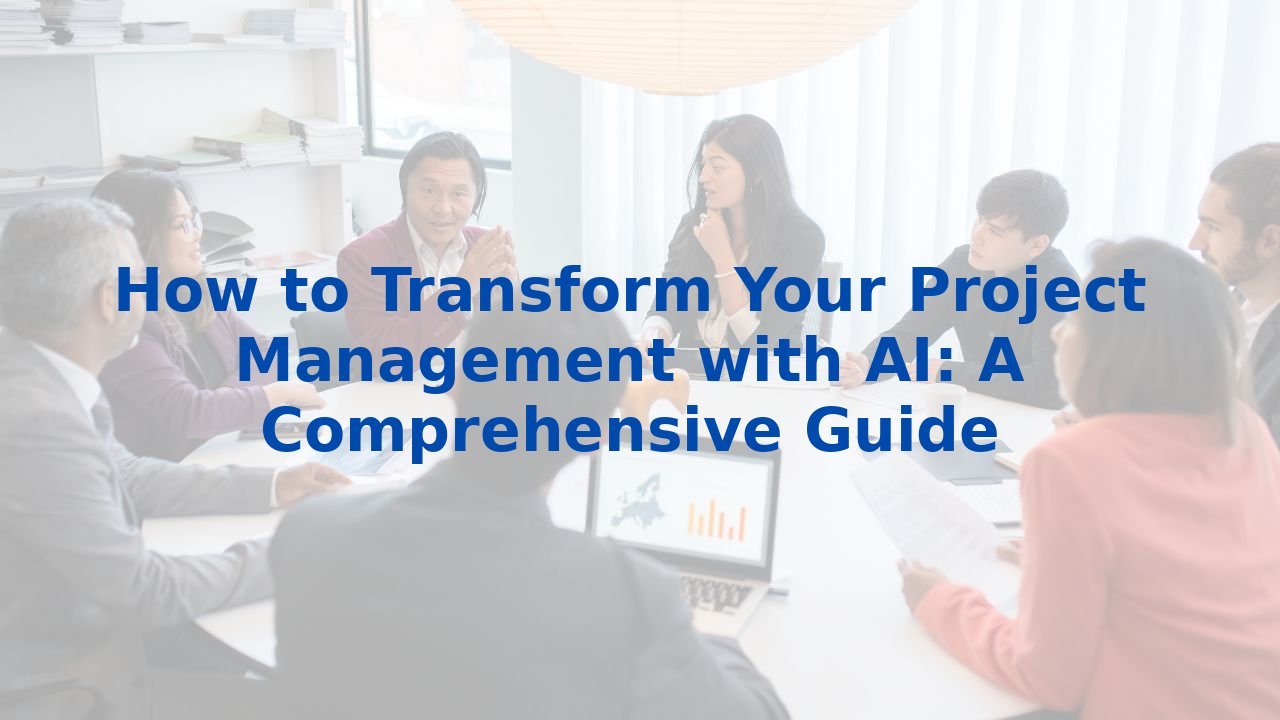How to Transform Your Project Management with AI: A Comprehensive Guide
How to Transform Your Project Management with AI: A Comprehensive Guide
Project management is the backbone of successful organizations, guiding teams through the intricate processes of planning, executing, and finalizing projects. In an ever-evolving landscape where time and resources are critical, artificial intelligence (AI) emerges as a game-changer. This guide explores the profound impact of AI in project management, emphasizing how it enhances efficiency and the inherent benefits to organizations willing to embrace this technology.
The Role of AI in Project Management
AI is not just a buzzword; it's a transformative force reshaping the project management paradigm. By automating mundane tasks and providing deep insights, AI enables project managers to refocus their efforts where they matter most. Here are several critical areas where AI is making a significant impact:
Automation of Routine Tasks
Imagine eliminating the hours spent on scheduling meetings or generating reports. AI can automate these repetitive tasks, freeing project managers to engage in higher-value activities, such as strategic decision-making and stakeholder collaboration.
Improved Accuracy and Risk Mitigation
With AI-powered tools analyzing vast data sets at lightning speed, the risk of human error diminishes substantially. This heightened accuracy is particularly valuable in cost estimations, risk assessments, and resource management. Enhanced data precision leads to better risk mitigation strategies, ensuring project timelines are not derailed unexpectedly.
Enhanced Decision-Making with Predictive Analytics
AI's capabilities extend to predictive analytics, enabling project managers to foresee potential roadblocks and operational delays. By assessing historical data and current trends, AI helps teams proactively adjust schedules and resources, steering projects toward successful outcomes.
Real-Time Monitoring and Reporting
Gone are the days of laboriously tracking progress through spreadsheets. AI-driven systems provide real-time project monitoring, offering updates on KPIs and project milestones. This immediate feedback allows for swift adjustments, enabling teams to remain agile and responsive to dynamic project needs.
Benefits of AI in Project Management
The advantages of integrating AI into project management are manifold, empowering organizations to streamline operations and maximize productivity. Here’s how:
Cost and Time Savings
Time is the essence of project management. By automating routine functions, AI reduces labor hours dedicated to manual tasks, translating into significant cost savings. This efficiency allows project managers to invest their time in steering projects toward innovative solutions.
Better Resource and Cost Management
AI's real-time tracking capabilities highlight areas of overspending, enabling proactive budget management. By pinpointing inefficiencies, organizations can eliminate waste and ensure resources are allocated effectively, ensuring maximum return on investment.
Automated Quality Control
Quality assurance is critical in project management. AI systems can conduct quality assessments at various stages of project execution, reducing manual intervention. This automated quality control ensures standards are consistently met, strengthening the final output.
Enhanced Collaboration
In any successful project, collaboration is key. AI tools facilitate seamless communication across diversified teams, organizing relevant information and reducing miscommunication. By fostering stronger teamwork, projects can benefit from a pooled knowledge that might otherwise go untapped.
The Importance of Employee Training for AI
As groundbreaking as AI is, its success hinges on the human element. Training employees to harness the power of AI tools is essential. Without proper guidance, even the most sophisticated technology can falter.
Building Essential Skills
Employees need a solid understanding of how AI operates or how to integrate these tools effectively into their workflows. Comprehensive training ensures that everyone is equipped with the skills necessary for success, maximizing the returns on AI investments.
Promoting Adaptability in a Rapidly Changing Landscape
The pace of technological advancement can feel overwhelming. Continuous training instills a culture of learning that allows organizations to stay ahead of the curve, ensuring employees are adaptable to evolving AI solutions.
Maximizing Efficiency Through Knowledge
Understanding AI functionalities empowers employees to tap into its full potential, using these tools to automate processes, analyze data efficiently, and make informed decisions. This knowledge translates into tangible efficiency gains for the organization.
Conclusion
The integration of AI into project management processes marks a pivotal shift in how organizations operate. By adopting AI technologies, businesses can enhance efficiency, improve accuracy, and foster informed decision-making. However, this transformation requires a dual approach—leveraging powerful AI tools while equipping employees with the skills and knowledge to use them effectively.
As we progress into an era defined by innovation and speed, organizations that embrace AI stand to gain a competitive edge, driving success and efficiency in their project management endeavors. The future is bright, and the journey towards AI-driven project management is ripe with potential.



